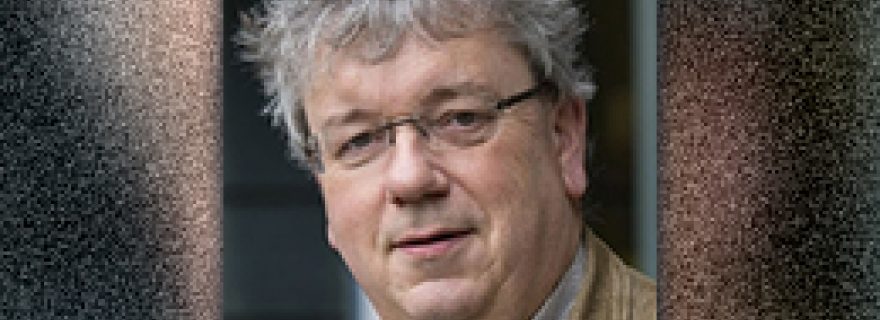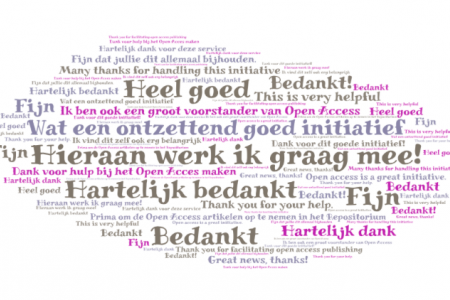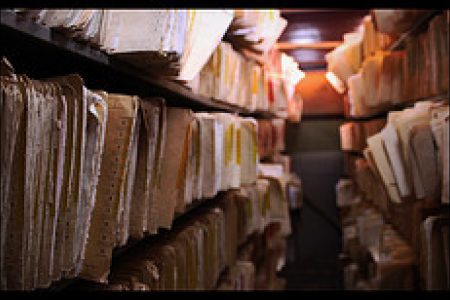Open Access means shared responsibility for research programs
In the International Open Access week, 23-29 October 2017 we are posting interviews conducted with Leiden researchers. Today Huub de Groot, LIC.
In the International Open Access week, 23-29 October 2017 we are posting interviews conducted with Leiden researchers.
Today Huub de Groot, LIC.
As professor at the Leiden Institute of Chemistry, Huub de Groot works with Magic Angle Spinning NMR at ultra high magnetic fields on ways to mimic nature’s ability to convert energy from sunlight: artificial photosynthesis. His research topic is one that attracts attention from experts and non-experts alike. He thinks policy makers should make their own judgement of facts versus opinions by open inquiry based on original research output, free from manipulation or coercion, to re-establish a profitable relationship between science and governance.
“My first Open Access article was probably in PNAS, some 8 years ago. It was an article about the determination of the structure of the chlorosome, a very peculiar biological antenna for harvesting solar light. We wanted to spread the results as widely as possible. At the moment everything we publish is Open Access.”
Did the choice for Open Access indeed lead to more publicity?
“In a way yes. Specifically in countries in developing economies, it was easier to access our research and this has led to additional exposure. As for exposure in The Netherlands, I mainly see a missed opportunity. On the one hand people say our research was funded by the public and it should have access to the results. On the other hand, once you do start publishing Open Access the public hardly spends time on reading these results.”
What about companies? Are they interested to read your research?
“The discipline of science is a much stronger discipline than the discipline of the market. Industry does not want to dig as deep as universities, they simply need enough reliable results to work from. Companies complain they can no longer trust the results from scientific research. This has nothing to do with scientific integrity, but it is mainly a consequence of us respecting the discipline of science by making reservations, asking for duplication and adding context. For the companies it is easy to get lost in this mist and noise surrounding a publication and they do not have the time to find out what the real discovery is.”
So whom do you see as main beneficiaries within The Netherlands?
“Right now, Funders and government often do not have access to our articles, our primary research output. Therefore we have to write reports to show what we do and it is easy to make these reports look better than they are. This distorts the scientific reality, and provides deceptive room for interpretation which in turn leads to different cults within science, as researchers follow the funders and do not have the time to read all publications themselves.”
What do you mean with cults? Isn’t science interdisciplinary?
“For example physicists and chemists have both created a scientific practice of their own. While both are considered exact, physics is hypothesis driven with a predominant theoretical basis while chemistry is heuristic with a predominant empirical basis. The consequence is that they can make beginners mistakes in each other’s fields if they cross the borders. On the one hand, beginners mistakes are easy to correct by their very nature, while on the other hand they can be quite persistent with dogma’s taking precedence over evidence, when the teachings of adjacent disciplines are ignored or even disdained.
The cult or dogmatic way of thinking compromises open inquiry and puts a bias on the outcome. For good science you have to be able to go against the flow, to find out what is really going on.”
How can Open Access solve this problem?
“Currently we see all too often that funder’s policy is based on the whims of market and politics. For lack of knowledge charlatans shout things that would breach my scientific integrity if I said them aloud. But these ideas are funded, while good proposals are rejected. I have given lectures to the ministries about it and they say: we know this, but we simply do not have the materials and knowledge to correct it. Another point is that lack of access to older materials leads to forgotten science as well; it happens quite often that research done over half a century ago is repeated.
If everything is Open Access, the responsibilities for following those lines of erratic research are no longer just in the researcher’s hands. They are also with the policy makers and funders, who can hire our PhD’s to help them make sense of the current state of science. They do not have to be experts, but they should be better than the scientist at his worst, to identify weaknesses. Once you have access to the original research output, you have your share of the responsibility when adopting a steering role in science policy and make judgements on how to achieve a profitable relationship between science and governance.”
What about the responsibility of the scientist?
“Don’t forget: scientists are just humans. They create their own international world and if no one asks them to get in line with utilitarian scientific practice, they will have to adhere to high scientific standards of their own club. Many scientists lead a double life: on the one hand they have projects that bring in money, and once the funding is there, they use it to contribute to what is important for the development of their science field in a global perspective. This is then evaluated by non-experts: not on the scientific output, but on reports, impact and H-factors.
I once went to a science dinner of the Rathenau Institute, where members of both houses of parliament were present. One of their chairs told us she had great ideas about what scientists should investigate. I sat there and all I could think was: you should never try to get these granted at NWO, as they do not meet the high standards imposed by the discipline of science and will be shot out of the air by the first referee you meet. This creates tension: people think they spend a lot on science, so their problems should be solved, but they are not. What are we doing with those billions of euros we receive every year if we say we do not have money for their requests? You need to understand what we do in order to guide us.”
Funding agencies already employ PhD’s from the right fields, why do they miss out?
“The number of people that genuinely do want to understand what we are doing is steadily increasing. For instance, I am working with a social scientist who is helping us and sees that many engineers are messing things up.
Biomass is a good example. 5 per cent of our gasoline has to be biobased by EG regulations. When the government wanted to increase this amount, many researchers saw easy money for their research. They made plans for pilot plants that could later ‘simply’ be made to work harder. But according to the first law of thermodynamics you can’t make energy out of nothing. In the end they had to think of all kinds of solutions behind the facade of the factory to increase production. For example they had to send trains to Russia to import wood for their factory.
Currently we see a similar problem in our discipline where it concerns the second law of thermodynamics. You can only convert energy from one type to another, and while doing so, you will produce entropy so that the energy is less usable. If you convert sun light to fuel, you will have a thermodynamical loss and the amount of this loss is highly underestimated. Fundamental principles are ignored as researchers say: when we get the money, we will make the process better. Maybe you will get it right after trying everything else. But excessive trial-and-error, heuristics, makes research unnecessary expensive and could be prevented in favour of more rapidly converging analytical approaches. The public who has open access to the raw research output will be able to discern between these errors and real research. As a scientist, you should expose such anomalies, but this is where I draw the line. The people you criticize are also your colleagues, and just like everyone else I want to work in a pleasant atmosphere.
What will Open Access change in chemistry?
“If you thoroughly read the literature, you know a climate model such as the one from the IPCC suggests we can forecast and analyse the climate without a structured and general understanding from a scientific perspective. You will discover that extreme computing science models are being developed based upon amongst others a chemical mass balance for system earth. Something that is a hard sell now, but once the literature is open, policy makers can be held responsible to ensure that their policies are based on the best research output that science has to offer.
Transparency might lead to changes in whole fields. If we take for example catalysis, a research subject that is based upon lots of empirical research. There are very few common principles, and the literature in the field is full of paradoxes as researchers in the field know. But these researchers think: we will notice when it goes wrong once it stops working. You might even call it modern day alchemy, and alchemy thrives on secrecy. If you open up all literature in this field and let well-educated policy makers and journalists have a good look, make connections and take their responsibility, avoiding scandals like diesel gate may become reality.”
What’s your opinion on the big deals made with publishers?
“I am drawn by the enormous collection of journals where we can publish Open Access. We have deals with the publishers where chemistry is ‘made’: the American Chemical Society, Wiley with Angewandte Chemie from the Gesellschaft Deutsche Chemiker, and the Royal Society of Chemistry.”
What if you had to choose between high impact and Open Access?
“High impact journals are increasingly under discussion. Hans Clevers said about publishing in these journals: 10 per cent of it is a result, the remaining 90 per cent is dreamt up. Not that it is wrong, but a small amount of real results is put into context and expanded. This is what people want, apparently.
We are currently working on a whole new idea where we hope to eventually publish around six articles on the same theme. We could send it to Nature Chemistry, but I think it would work better as an Open Access series of articles in a single journal such as Chemistry, a European Journal. Our research is qualitatively strong, it might not make the news, but it will be remembered for a longer period of time.”
Do you think articles are too fragmented nowadays?
“Nicolaas Bloembergen has just passed away. He is best known for his article on the theory of relaxation in NMR. He used to publish around 1 article per year instead of 25 articles per year as many people do nowadays. But this one article had more impact than 25 articles from current scientists. I think we should return partially to this method and take time to think before we publish. Escape conference hypes and think deeply. In the end you will get the credits.
As an expert reviewer for the Swiss science foundation I recently got the same task: do not look at H-factors and impact, but evaluate the real science. What do scientists have to offer and does it really matter? With Open Access anyone who desires to be part of a responsible elite can focus on solid work instead of drawing fast conclusions, usually riddled with mistakes, omissions and unrealistic additions that are the inevitable consequence of manipulation and coercion based on political truth and short term interests of both science experts and the public. For those who graduated from our universities with a PhD license that admits them by law to practice science independently, this is actually a matter of integrity: a PhD degree is to be considered a privilege with responsibilities towards both science and society.”





